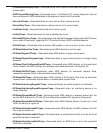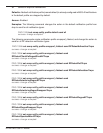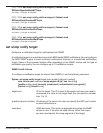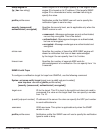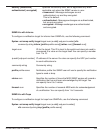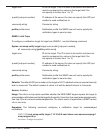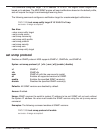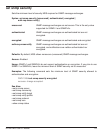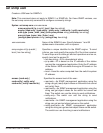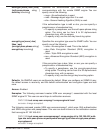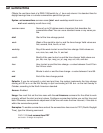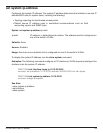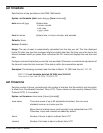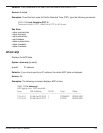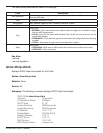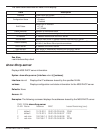
D-Link DWS-1008 CLI Manual 113
set snmp usm
Creates a USM user for SNMPv3.
Note: This command does not apply to SNMPv1 or SNMPv2c. For these SNMP versions, use
the set snmp community command to configure community strings.
Syntax: set snmp usm usm-username
snmp-engine-id {ip ip-addr | local | hex hex-string}
access {read-only | read-notify | notify-only | read-write | notify-read-write}
auth-type {none | md5 | sha} {auth-pass-phrase string | auth-key hex-string}
encrypt-type {none | des | 3des | aes}
{encrypt-pass-phrase string | encrypt-key hex-string}
usm-username Name of the SNMPv3 user. Specify between 1 and 32
alphanumeric characters, with no spaces.
snmp-engine-id {ip ip-addr |
local | hex hex-string}
Specifies a unique identifier for the SNMP engine. To send
informs, you must specify the engine ID of the inform receiver.
To send traps and to allow get and set operations and so on,
specify local as the engine ID.
• hex hex-string—ID is a hexadecimal string.
• ip ip-addr—ID is based on the IP address of the station
running the management application. Enter the IP address
of the station. MSS calculates the engine ID based on the
address.
• local—Uses the value computed from the switch’s system
IP address.
Specifies the access level of the user:
• read-only—An SNMP management application using the
string can get (read) object values on the switch but cannot
set (write) them.
• read-notify—An SNMP management application using the
string can get object values on the switch but cannot set
them. The switch can use the string to send notifications.
• notify-only—The switch can use the string to send
notifications.
• read-write—An SNMP management application using the
string can get and set object values on the switch.
• notify-read-write—An SNMP management application
using the string can get and set object values on the switch.
The switch can use the string to send notifications.
access {read-only |
read-notify | notify-only |
read-write | notify-read-write}



